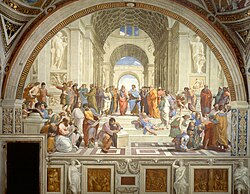| Renaissance |
|---|
 |
| Aspects |
| Regions |
| History and study |
The French Renaissance was the cultural and artistic movement in France between the 15th and early 17th centuries. The period is associated with the pan-European[1] Renaissance, a word first used by the French historian Jules Michelet to define the artistic and cultural "rebirth" of Europe.
Notable developments during the French Renaissance include the spread of humanism, early exploration of the "New World" (as New France by Giovanni da Verrazzano and Jacques Cartier); the development of new techniques and artistic forms in the fields of printing, architecture, painting, sculpture, music, the sciences and literature; and the elaboration of new codes of sociability, etiquette and discourse.
The French Renaissance traditionally extends from (roughly) the 1494 French invasion of Italy during the reign of Charles VIII until the 1610 death of Henry IV, with an apex during the 1515–1559 reigns of Francis I and Henry II.
This chronology notwithstanding, certain artistic, technological or literary developments associated with the Renaissance arrived in France earlier (for example, by way of the Burgundy court or the papal court in Avignon); however, the Black Death of the 14th century and the Hundred Years' War kept France economically and politically weak until the late 15th century.